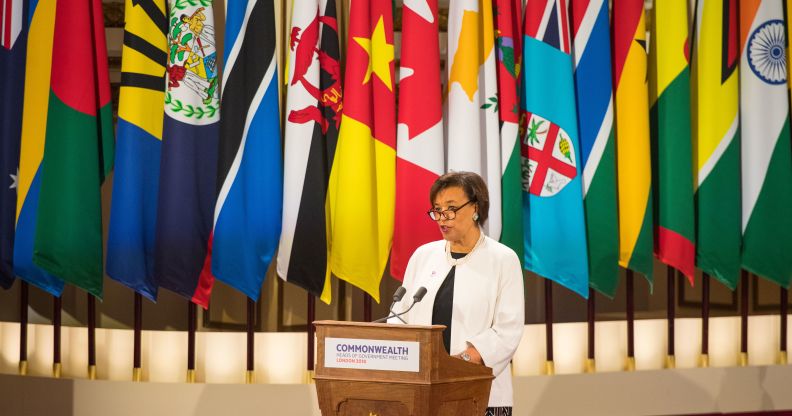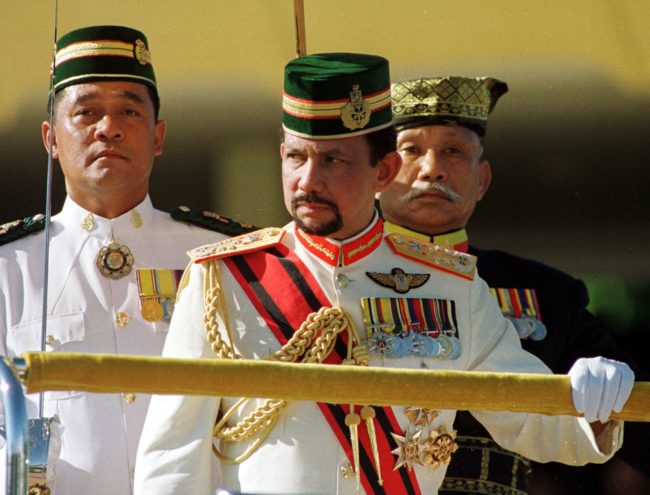Commonwealth chief says Brunei ‘death to gays’ law violates human rights

Commonwealth Secretary-General Patricia Scotland gives a speech at the formal opening of the Commonwealth Heads of Government Meeting (Dominic Lipinski-WPA Pool/Getty)
The Secretary-General of the Commonwealth, Baroness Scotland, has spoken out after member state Brunei imposed a law that introduces the death penalty for homosexuality.
The Southeast Asian country has faced an international backlash over its harsh new penal code, which allow death by stoning as a punishment for gay sex or adultery, while lesbian sex is punished by 100 lashes with a whip.
MPs have called for the country, which was a British colony until 1984, to be suspended from the Commonwealth due to the law.
Baroness Scotland: New Brunei penal code violates human rights commitments
In a statement to the i newspaper, Commonwealth Secretary-General Baroness Scotland said that she had “strongly urged” the Brunei government to repeal the law.
The baroness said Brunei had “committed itself to upholding the values and principles of the Commonwealth Charter which underscores a commitment to the Universal Declaration of Human Rights and other relevant human rights covenants and international instruments.”

Brunei’s sultan Hassanal Bolkiah. (ROSLAN RAHMAN/AFP/Getty Images)
She added: “I have communicated my concern to the Government of Brunei, strongly urging it to reconsider the introduction of the punishments proposed under the new Penal Code which, if implemented in its current form, will potentially bring into effect cruel and inhuman punishments which contravene international human rights law and standards.
“The Commonwealth Secretariat is ready and willing to provide Brunei Darussalam with technical assistance and to advise on the formulation of a revised Penal Code in accordance with the values and principles of the Commonwealth Charter and in compliance with international human rights law and obligations including on the issue of harmonisation.”
However, she did not go as far as responding to calls for Brunei to be ejected from the Commonwealth.
MPs call for Brunei to be suspended from Commonwealth
UK Labour MP Khalid Mahmood had told Parliament: “It is a clear breach of Brunei’s obligations under the Commonwealth charter on human rights [which must have] immediate consequences for Brunei’s membership of the Commonwealth.
“It is time for the Commonwealth to draw a line in the sand on LGBT rights, and that line must be drawn now in relation to Brunei. We cannot be in a situation whereby a Commonwealth country announces plans to stone and whip LGBT people to death and the Commonwealth does nothing.”
Tory MP Philip Hollobone, who is usually an opponent of LGBT+ rights, also called on the government to “make clear that such punishments are simply incompatible with Commonwealth membership.”
However, UK foreign office minister Mark Field responded that it was better to “work within the broad international community” to pressure Brunei “rather than threatening to kick countries out of the Commonwealth.”
The Conservative minister added: “The Sultan of Brunei has been a great friend of this country over many years.
“He has, I think, become a little more devout as he has got older, which is one reason why the sharia code has been put in place.
“However, I am hopeful that we can continue to have a positive and constructive dialogue on this issue, with Brunei and with a number of countries that we would like to see making changes in future.”
Brunei is far from alone in the Commonwealth in imposing anti-LGBT laws,
36 of the 53 countries in the Commonwealth continue to criminalise same-sex acts, primarily under laws imposed during the British Colonial era that were never repealed.
More than a billion people live under anti-gay laws in the Commonwealth.
In 2018,Theresa May told Commonwealth leaders that the UK “deeply regrets” its legacy on anti-gay laws.

